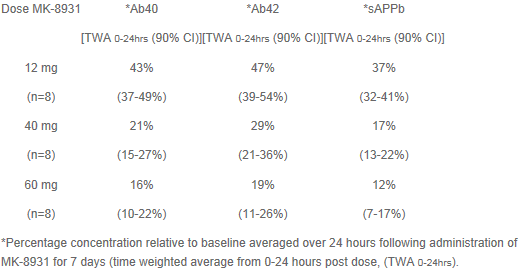Merck presents findings from Phase 1b study of investigational BACE inhibitor, MK-8931, in patients with Alzheimer’s Disease
Posted: 14 July 2013 | | No comments yet
Results from a Phase Ib study…


Merck, known as MSD outside the United States and Canada, today announced the presentation of results from a Phase Ib study showing a dose-dependent decrease in β amyloid levels in cerebral spinal fluid (CSF) following administration of MK-8931, Merck’s investigational oral β-site amyloid precursor protein cleaving enzyme (BACE1 or β secretase) inhibitor, in patients with mild to moderate Alzheimer’s disease (AD). In the study, β amyloid levels were analyzed as a measure of BACE activity. The data were presented during an oral session at the Alzheimer’s Association International Conference (AAIC) in Boston, July 13-18 (Abstract O1-06-05).
“The amyloid β reduction observed with MK-8931 may offer an opportunity to further understand the role BACE1 inhibition plays in the underlying pathology of Alzheimer’s disease,” said Darryle Schoepp, Ph.D., vice president of Neuroscience Early Development and Discovery Sciences, Merck. “Further evaluation of MK-8931 continues in our EPOCH study, a Phase II/III trial in patients with mild to moderate Alzheimer’s.”
Results of MK-8931 Phase Ib Study
The randomized, double-blind, placebo-controlled multiple dose study evaluated the safety and tolerability, pharmacokinetics and pharmacodynamic profile of MK-8931 in patients with mild to moderate AD (n=32). Patients were randomized to receive one of three doses (12 mg, 40 mg and 60 mg) orally of MK-8931 or placebo once-daily for seven days. Samples of CSF were collected via a lumbar catheter and analyzed for levels of amyloid β 40 (Aβ40), amyloid β 42 (Ab42) and soluble amyloid precursor protein β (sAPPb) as biomarkers of BACE1 activity.
In this study, administration of MK-8931 at doses of 12, 40 and 60 mg resulted in a dose-dependent and sustained reduction in the levels of Ab40, a measure of BACE1 activity, in CSF from baseline of 57, 79 and 84 percent, respectively. The mean percentage of baseline in biomarkers Aβ40, Aβ42 and sAPPβ for each dose of MK-8931 as measured following a seven day dosing period is shown in the table.


CI=confidence interval
No serious adverse events or study discontinuations due to adverse events were recorded. Analysis of vital signs and laboratory assessments, including liver function tests, showed no statistically significant changes related to the administration of MK-8931. Adverse events reported in two or more subjects in at least one dose group included: headache, dizziness, nausea, vomiting, insomnia and back pain. All adverse events were generally mild to moderate in intensity and transient in duration. No dose-dependent increase in the incidence of adverse events was observed.
Previously, Merck researchers presented findings of a single dose Phase I study at the 2012 American Academy of Neurology (AAN) Annual Meeting, which demonstrated that administration of MK-8931 to healthy volunteers resulted in a reduction of Ab40 CSF levels of greater than 90 percent from baseline.
Other MK-8931 Presentations at AAIC 2013
•Consistency of BACE1-mediated Brain Amyloid Production Inhibition by MK-8931 in Alzheimer’s Patients and Healthy Young Adults (Oral Session; July 17, 2013; 2:15 PM; Presentation #O4-05-05)
About the EPOCH Study
EPOCH (NCT01739348) is a 78-week, randomized, placebo-controlled, parallel-group, double-blind Phase II/III clinical trial to evaluate the efficacy and safety of three oral doses of MK-8931 (12, 40 or 60 mg) administered daily versus placebo in patients with mild to moderate AD. The study is currently enrolling the 200 patient Phase II portion of the study and is anticipated to enroll up to 1,700 patients in the main Phase III cohort. The primary efficacy outcomes of the study are the change from baseline in Alzheimer’s Disease Assessment Scale Cognitive Subscale (ADAS-Cog) score and the change from baseline in the Alzheimer’s Disease Cooperative Study – Activities of Daily Living (ADCS-ADL) score.
About BACE Inhibition and MK-8931
The amyloid hypothesis asserts that the formation of amyloid peptides that lead to amyloid plaque deposits in the brain is a primary contributor to the underlying cause of Alzheimer’s disease. BACE is believed to be a key enzyme in the production of amyloid β peptide. Evidence suggests that inhibiting BACE decreases the production of amyloid β peptide and may therefore reduce amyloid plaque formation and modify disease progression.
Merck is advancing several innovative mechanisms in Alzheimer’s disease, including candidates designed to modify disease progression and improve symptom control. Merck’s major effort in disease modification is our lead BACE inhibitor, MK-8931, and Merck is continuing to develop other BACE inhibitor candidates.




